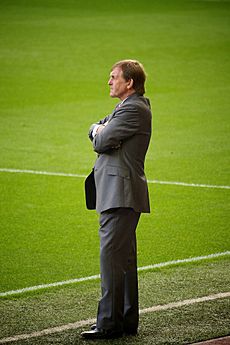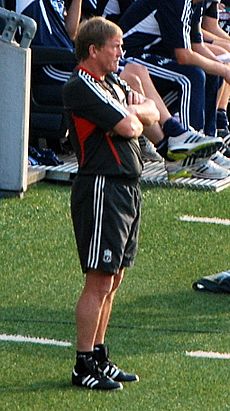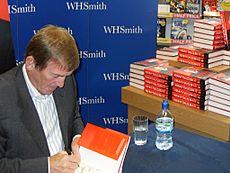Kenny Dalglish facts for kids
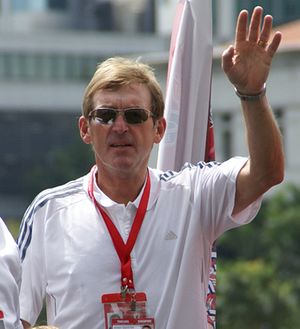
Dalglish in 2009
|
|||
| Personal information | |||
|---|---|---|---|
| Full name | Kenneth Mathieson Dalglish | ||
| Date of birth | 4 March 1951 | ||
| Place of birth | Glasgow, Scotland | ||
| Height | 5 ft 8 in (1.73 m) | ||
| Position(s) | Forward | ||
| Youth career | |||
| 1967–1968 | Cumbernauld United | ||
| 1968–1969 | Celtic | ||
| Senior career* | |||
| Years | Team | Apps | (Gls) |
| 1969–1977 | Celtic | 204 | (111) |
| 1977–1990 | Liverpool | 355 | (118) |
| Total | 559 | (229) | |
| International career | |||
| 1972–1976 | Scotland U23 | 4 | (2) |
| 1971–1986 | Scotland | 102 | (30) |
| Managerial career | |||
| 1985–1991 | Liverpool | ||
| 1991–1995 | Blackburn Rovers | ||
| 1997–1998 | Newcastle United | ||
| 2000 | Celtic (interim) | ||
| 2011–2012 | Liverpool | ||
| *Club domestic league appearances and goals | |||
Sir Kenneth Mathieson Dalglish, born on March 4, 1951, is a famous Scottish former football player and manager. Many people think he is one of the greatest players ever. He is especially loved by fans of Celtic, Liverpool, and the Scotland national team.
During his amazing career, Dalglish played 338 games for Celtic and 515 games for Liverpool. He was a forward, which means he played at the front of the team to score goals. He also played a record 102 games for Scotland, scoring 30 goals, which is also a record! He won many awards, including the Ballon d'Or Silver Award in 1983. In 2009, FourFourTwo magazine called him the best striker in British football after World War II. He is in both the Scottish and English Football Halls of Fame. Liverpool fans still call him "King Kenny" because they admire him so much.
Contents
Kenny Dalglish: A Football Legend
Kenny Dalglish started his professional journey with Celtic in 1971. There, he won four Scottish league championships, four Scottish Cups, and one Scottish League Cup. In 1977, Liverpool's manager Bob Paisley paid a record £440,000 to bring Dalglish to Liverpool. His time at Liverpool was incredibly successful. He helped the club win six English league championships, the FA Cup, four League Cups, five FA Charity Shields, three European Cups, and one European Super Cup.
Playing for Scotland
For the Scottish national team, Dalglish played 102 games and scored 30 goals between 1971 and 1986. This made him Scotland's most capped player and joint top goal scorer with Denis Law. He played in the FIFA World Cup for Scotland in 1974, 1978, and 1982. He was also chosen for the 1986 World Cup squad but could not play due to an injury.
Becoming a Player-Manager
In 1985, Dalglish became the player-manager of Liverpool after Joe Fagan retired. This meant he was both a player and the team's manager. He led Liverpool to win three more First Division titles, two FA Cups, and four FA Charity Shields. He left Liverpool in 1991.
Eight months later, Dalglish returned to football management with Blackburn Rovers. He took them from the Second Division all the way to winning the Premier League in 1995! After this, he became the club's director of football before leaving in 1996.
In 1997, Dalglish became manager of Newcastle United. They finished second in the Premier League in his first season. However, the next season was not as good, and he was dismissed. Dalglish then became director of football at Celtic in 1999 and briefly managed them. He won the Scottish League Cup in 2000 before leaving that year.
Helping Others and Returning to Liverpool
From 2000 to 2010, Dalglish focused on charity work. He started The Marina Dalglish Appeal with his wife to raise money for cancer care. In January 2011, Dalglish came back to Liverpool as a temporary manager after Roy Hodgson left. He became the permanent manager in May 2011. Even though Liverpool won the League Cup (their first trophy since 2006) and reached the FA Cup Final, they finished 8th in the Premier League. Dalglish was dismissed in May 2012.
In October 2013, Dalglish returned to Liverpool as a non-executive director. In October 2018, the Centenary Stand at Anfield stadium was renamed the Sir Kenny Dalglish Stand to honor him.
Early Life and First Steps
Kenny Dalglish was born in Dalmarnock, a part of Glasgow, Scotland. He grew up in Milton. When he was 14, his family moved to Ibrox, which was close to the home ground of Rangers, the team he supported as a child.
Dalglish went to Miltonbank Primary School and started playing football as a goalkeeper. He later attended High Possil Senior Secondary School, where he won school football competitions. He also won the Scottish Cup playing for Glasgow Schoolboys. In 1966, Dalglish had trials with West Ham United and Liverpool, but he wasn't signed by them at that time.
Club Career Highlights
Playing for Celtic
Dalglish signed his first professional contract with Celtic in May 1967. In his first season, he was loaned to Cumbernauld United, where he scored 37 goals. He also worked as an apprentice joiner. Celtic's manager Jock Stein wanted Dalglish to stay at Cumbernauld for another season, but Dalglish wanted to become a full professional.
He got his wish and became a regular in Celtic's reserve team, known as the "Quality Street Gang" because it had many talented young players. Dalglish made his first team debut for Celtic on September 25, 1968, in a Scottish League Cup game.
In the 1970–71 season, Dalglish started scoring many goals for the reserves. A memorable moment was in the Reserve Cup Final against Rangers, where he scored a hat-trick in a 6–1 win. He was in the stands when the Ibrox disaster happened in January 1971, a sad event where many Rangers fans lost their lives.
The 1971–72 season was when Dalglish truly became a key player for Celtic. He scored his first goal for the first team on August 14, 1971, against Rangers. He scored 29 goals in 53 games that season, helping Celtic win their seventh league title in a row. Dalglish also played in Celtic's 6–1 win over Hibernian in the 1972 Scottish Cup Final. In the 1972–73 season, he was Celtic's top scorer with 39 goals, and the club won the league again.
Celtic won another league and cup double in 1973–74 and reached the semi-finals of the European Cup. Dalglish won another Scottish Cup medal in 1975. He became Celtic captain in the 1975–76 season. Celtic won another league and cup double in 1976–77, with Dalglish scoring 27 goals. On August 10, 1977, after playing 320 games and scoring 167 goals for Celtic, Dalglish was signed by Liverpool for a record fee.
Becoming a Liverpool Legend
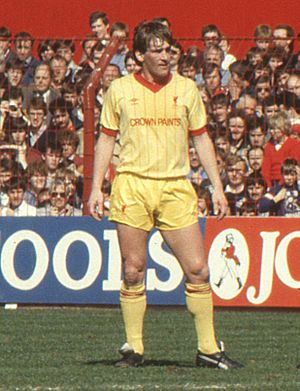
Dalglish joined Liverpool to replace the popular player Kevin Keegan. He quickly settled in, making his debut on August 13, 1977, and scoring his first goal a week later. He also scored in his first game at Anfield stadium. By the end of his first season, Dalglish had played 62 games and scored 31 goals, including the winning goal in the 1978 European Cup Final.
In his second season, Dalglish scored 21 league goals and was named Football Writers' Association Footballer of the Year. He played almost every league game for Liverpool until the 1980–81 season. Even though Liverpool finished fifth in the league that year, they still won the European Cup and Football League Cup. He regained his scoring form the next season, scoring 13 goals as Liverpool won the league again. Around this time, he formed a strong partnership with Ian Rush, often playing just behind him.
Dalglish was voted PFA Players' Player of the Year for the 1982–83 season, scoring 18 league goals as Liverpool won the title again. After 1983, he scored fewer goals but remained a regular player.
When he became player-manager in 1985, after the sad Heysel Stadium disaster, Dalglish played in 21 league games in the 1985–86 season as Liverpool won the "double" (both the league and FA Cup). He scored the winning goal on the last day of the season to secure the league title. By the 1986–87 season, he played less often, focusing on giving younger players a chance.
With Ian Rush moving to Juventus in 1987, Dalglish brought in new strikers John Aldridge and Peter Beardsley. He played only twice in the 1987–88 season, which saw Liverpool win their 17th league title. Dalglish did not play in the 1988–89 season. His final league appearance was on May 5, 1990, as a substitute. At 39, he was one of the oldest players to play for Liverpool. His last goal was in April 1987.
International Career for Scotland
Tommy Docherty gave Dalglish his first game for Scotland on November 10, 1971. Dalglish scored his first goal for Scotland a year later, on November 15, 1972. He was part of Scotland's 1974 World Cup squad and played in all three games.
In 1976, Dalglish scored the winning goal for Scotland against England. A year later, he scored against the same team and goalkeeper at Wembley in another 2–1 win. Dalglish played in the 1978 World Cup in Argentina, scoring against the Netherlands. He also played in the 1982 World Cup in Spain, scoring against New Zealand. Scotland did not get past the group stage in either tournament. Dalglish was chosen for the 1986 World Cup squad but had to pull out due to injury.
In total, Dalglish played 102 times for Scotland, which is a national record. He also scored 30 goals, matching the record set by Denis Law. He was the first player to reach 100 caps for Scotland in a friendly match against Romania on March 26, 1986. His last game for Scotland was on November 12, 1986. His 30th and final international goal was two years earlier, in a 3–1 win over Spain.
Managerial Career
Leading Liverpool as Manager
After the sad events of the Heysel Stadium disaster in 1985 and Joe Fagan's resignation, Dalglish became Liverpool's player-manager. In his first season, 1985–86, he led the club to its first "double" by winning both the League Championship and the FA Cup.
The 1986–87 season was without trophies for Liverpool. Before the 1987–88 season, Dalglish signed new players like Peter Beardsley and John Barnes. He had already bought John Aldridge to replace Ian Rush. This new Liverpool team was at the top of the league for almost the entire season, going 37 matches unbeaten. Liverpool won the league with four games left to play. However, Dalglish's team lost the 1988 FA Cup Final to Wimbledon.
In 1988, Dalglish brought Ian Rush back to Liverpool. Liverpool beat Everton 3–2 in the 1989 FA Cup final. In the 1989–90 season, Liverpool won their third league title under Dalglish. He received his third Manager of the Year award at the end of the season.
Dalglish resigned as Liverpool manager on February 22, 1991. His decision surprised many in football. He explained that he had pushed himself to the limit for 20 years. At the time he left, Liverpool was leading the league and still in the FA Cup.
The Hillsborough Disaster
Dalglish was the manager of Liverpool during the Hillsborough disaster on April 15, 1989. This tragic event deeply affected him. He attended many funerals of the victims. His support and presence after the disaster were seen as incredibly important and brave. During a memorial service in 2011, a Liverpool MP suggested Dalglish should be knighted for his football career, his charity work, and his actions after Hillsborough.
Managing Blackburn Rovers
Dalglish returned to management in October 1991 with Second Division team Blackburn Rovers. The club had recently been bought by a wealthy owner, Jack Walker. By early 1992, they were at the top of the Second Division. Dalglish led Blackburn into the new Premier League by winning the play-off final at Wembley. This meant Blackburn was back in the top division of English football for the first time since 1966.
In 1992, Dalglish signed Alan Shearer for a British record fee. Despite Shearer being injured for half the season, Dalglish led the team to fourth place in the first Premier League season. The next year, Blackburn finished second to Manchester United. By this time, Dalglish had added England players Tim Flowers and David Batty to his team.
At the start of the 1994–95 season, Dalglish paid a record £5 million for Chris Sutton. Sutton and Shearer formed a very strong attacking partnership. On the last day of the season, both Blackburn and Manchester United could win the title. Blackburn lost their game, but still won the title because Manchester United also failed to win. This title meant Dalglish was only the fourth manager in history to lead two different clubs to win the top league championship in England. Dalglish became director of football at Blackburn in June 1995. He left the club in 1996.
Time at Newcastle United
In January 1997, Dalglish became manager of Newcastle United. He led the club to finish second in the Premier League that season. However, the 1997–98 season saw Newcastle finish in 13th place. Despite some successes, like a Champions League win over Barcelona and reaching the FA Cup final, he was dismissed in August 1998.
Managing Celtic Again
In June 1999, Dalglish was appointed director of football operations at Celtic. His former Liverpool player John Barnes became head coach. Barnes was dismissed in February 2000, and Dalglish took temporary charge of the first team. He led them to win the Scottish League Cup before leaving the club in June 2000.
Return to Liverpool (Second Time)
In April 2009, Liverpool manager Rafael Benítez invited Dalglish to work at the club's youth academy. He also became a club ambassador. After Benítez left in June 2010, Dalglish helped find a replacement.
After a poor start to the 2010–11 season, Liverpool fans wanted Dalglish to return as manager. When Roy Hodgson left, Dalglish was appointed caretaker manager on January 8, 2011. His first game was against Manchester United, which Liverpool lost. His first league game was against Blackpool, also a loss.
Dalglish soon said he wanted the job permanently. On January 22, 2011, he led Liverpool to their first win since his return. He signed Andy Carroll and Luis Suárez at the end of January. After a strong win against Chelsea in February 2011, many thought it was only a matter of time before he became the long-term manager.
On May 12, 2011, Liverpool announced that Dalglish had a three-year contract. His second time as manager at Anfield had some difficult moments. In February 2012, Dalglish led Liverpool to their first trophy in six years, winning the 2011–12 Football League Cup. They also reached the 2012 FA Cup Final but lost to Chelsea. However, Liverpool finished eighth in the league, their worst finish since 1994. Because of this, Liverpool dismissed Dalglish on May 16, 2012.
In October 2013, Dalglish returned to Liverpool as a non-executive director. On October 13, 2017, Anfield's Centenary Stand was officially renamed the Sir Kenny Dalglish Stand to honor his amazing contributions to the club.
Personal Life
Dalglish has been married to Marina since November 26, 1974. They have four children, including Kelly and Paul. Kelly works as a football presenter, and Paul followed his father's path as a footballer. Marina was diagnosed with breast cancer in 2003 but recovered. She later started a charity to help fund new cancer treatment equipment for hospitals.
Recognition and Awards
Dalglish was given the Member of the Order of the British Empire (MBE) award in 1985 for his services to football. He was made a Knight Bachelor in 2018 for his contributions to football, charity, and the City of Liverpool. He said he was "Humbled" and "A wee bit embarrassed" by the award, dedicating it to his former coaches.
In 2002, Celtic supporters voted Dalglish into their greatest Celtic team of all time. He was also one of the first people to be inducted into the English Football Hall of Fame in 2002 and the Scottish Football Hall of Fame in 2004. Liverpool fans still lovingly call him "King Kenny." In 2006, Liverpool fans voted him top in their poll "100 Players Who Shook the Kop." In 2009, FourFourTwo magazine named Dalglish the greatest striker in British football after World War II.
On December 19, 2023, Dalglish received the BBC Sports Personality of the Year Lifetime Achievement Award.
Charitable Work
In 2005, Dalglish and his wife started the Marina Dalglish Appeal charity to raise money for cancer treatment. Dalglish has taken part in many events to raise money for the charity. In June 2007, a Centre for Oncology was opened at Aintree University Hospital after the charity raised £1.5 million. In 2012, the foundation donated £2 million to The Walton Centre to buy a new MRI scanner.
Dalglish often plays in the annual Gary Player Invitational Tournament, a charity golf event that raises money for children's causes worldwide.
On July 1, 2011, Dalglish received an honorary degree from the University of Ulster for his services to football and charity.
Career Statistics
Club
| Club | Season | League | National cup | League cup | Europe | Other | Total | |||||||
|---|---|---|---|---|---|---|---|---|---|---|---|---|---|---|
| Division | Apps | Goals | Apps | Goals | Apps | Goals | Apps | Goals | Apps | Goals | Apps | Goals | ||
| Celtic | 1968–69 | Scottish Division One | 0 | 0 | 0 | 0 | 1 | 0 | 0 | 0 | – | 1 | 0 | |
| 1969–70 | Scottish Division One | 2 | 0 | 0 | 0 | 2 | 0 | 0 | 0 | – | 4 | 0 | ||
| 1970–71 | Scottish Division One | 3 | 0 | 1 | 0 | 0 | 0 | 1 | 0 | 2 | 0 | 7 | 0 | |
| 1971–72 | Scottish Division One | 31 | 17 | 4 | 1 | 8 | 5 | 7 | 0 | 3 | 6 | 53 | 29 | |
| 1972–73 | Scottish Division One | 32 | 21 | 6 | 5 | 11 | 10 | 4 | 3 | 3 | 0 | 56 | 39 | |
| 1973–74 | Scottish Division One | 33 | 18 | 6 | 1 | 10 | 3 | 7 | 2 | 3 | 1 | 59 | 25 | |
| 1974–75 | Scottish Division One | 33 | 16 | 5 | 2 | 8 | 3 | 2 | 0 | 3 | 0 | 51 | 21 | |
| 1975–76 | Scottish Premier Division | 35 | 24 | 1 | 1 | 10 | 4 | 5 | 3 | 2 | 0 | 53 | 32 | |
| 1976–77 | Scottish Premier Division | 35 | 15 | 7 | 1 | 10 | 10 | 2 | 1 | – | 54 | 27 | ||
| Total | 204 | 111 | 30 | 11 | 60 | 35 | 28 | 9 | 16 | 7 | 338 | 173 | ||
| Liverpool | 1977–78 | First Division | 42 | 20 | 1 | 1 | 9 | 6 | 9 | 4 | 1 | 0 | 62 | 31 |
| 1978–79 | First Division | 42 | 21 | 7 | 4 | 1 | 0 | 4 | 0 | – | 54 | 25 | ||
| 1979–80 | First Division | 42 | 16 | 8 | 2 | 7 | 4 | 2 | 0 | 1 | 1 | 60 | 23 | |
| 1980–81 | First Division | 34 | 8 | 2 | 2 | 8 | 7 | 9 | 1 | 1 | 0 | 54 | 18 | |
| 1981–82 | First Division | 42 | 13 | 3 | 2 | 10 | 5 | 6 | 2 | 1 | 0 | 62 | 22 | |
| 1982–83 | First Division | 42 | 18 | 3 | 1 | 7 | 0 | 5 | 1 | 1 | 0 | 58 | 20 | |
| 1983–84 | First Division | 33 | 7 | 0 | 0 | 8 | 2 | 9 | 3 | 1 | 0 | 51 | 12 | |
| 1984–85 | First Division | 36 | 6 | 7 | 0 | 1 | 0 | 7 | 0 | 2 | 0 | 53 | 6 | |
| 1985–86 | First Division | 21 | 3 | 6 | 1 | 2 | 1 | – | 2 | 2 | 31 | 7 | ||
| 1986–87 | First Division | 18 | 6 | 0 | 0 | 5 | 2 | – | 2 | 0 | 25 | 8 | ||
| 1987–88 | First Division | 2 | 0 | 0 | 0 | 0 | 0 | – | – | 2 | 0 | |||
| 1988–89 | First Division | 0 | 0 | 0 | 0 | 1 | 0 | – | 1 | 0 | 2 | 0 | ||
| 1989–90 | First Division | 1 | 0 | 0 | 0 | 0 | 0 | – | – | 1 | 0 | |||
| Total | 355 | 118 | 37 | 13 | 59 | 27 | 51 | 11 | 13 | 3 | 515 | 172 | ||
| Career total | 559 | 229 | 67 | 24 | 119 | 62 | 79 | 20 | 29 | 10 | 853 | 345 | ||
International
| National team | Year | Apps | Goals |
|---|---|---|---|
| Scotland | 1971 | 2 | 0 |
| 1972 | 2 | 1 | |
| 1973 | 9 | 1 | |
| 1974 | 11 | 4 | |
| 1975 | 10 | 2 | |
| 1976 | 6 | 3 | |
| 1977 | 10 | 7 | |
| 1978 | 10 | 3 | |
| 1979 | 9 | 1 | |
| 1980 | 8 | 1 | |
| 1981 | 4 | 1 | |
| 1982 | 8 | 4 | |
| 1983 | 4 | 0 | |
| 1984 | 3 | 2 | |
| 1985 | 3 | 0 | |
| 1986 | 3 | 0 | |
| Total | 102 | 30 | |
Managerial Record
| Team | From | To | Record | Ref | ||||
|---|---|---|---|---|---|---|---|---|
| P | W | D | L | Win % | ||||
| Liverpool | 30 May 1985 | 21 February 1991 | 307 | 187 | 78 | 42 | 60.9 | |
| Blackburn Rovers | 12 October 1991 | 25 June 1995 | 196 | 103 | 46 | 47 | 52.6 | |
| Newcastle United | 14 January 1997 | 27 August 1998 | 78 | 30 | 22 | 26 | 38.5 | |
| Celtic | 10 February 2000 | 1 June 2000 | 18 | 10 | 4 | 4 | 55.6 | |
| Liverpool | 8 January 2011 | 16 May 2012 | 74 | 35 | 17 | 22 | 47.3 | |
| Total | 673 | 365 | 167 | 141 | 54.2 | — | ||
Honours
Player
Celtic
- Scottish Division One/Premier Division: 1971–72, 1972–73, 1973–74, 1976–77
- Scottish Cup: 1971–72, 1973–74, 1974–75, 1976–77
- Scottish League Cup: 1974–75
Liverpool
- Football League First Division: 1978–79, 1979–80, 1981–82, 1982–83, 1983–84, 1985–86
- FA Cup: 1985–86
- Football League Cup: 1980–81, 1981–82, 1982–83, 1983–84
- FA Charity Shield: 1977 (shared), 1979, 1980, 1982, 1986 (shared)
- European Cup: 1977–78, 1980–81, 1983–84
- European Super Cup: 1977
Scotland
- British Home Championship: 1974, 1976, 1977
Individual
- Scottish Premier Division Top-scorer: 1975–76 (24 goals)
- Ballon d'Or runner-up: 1983
- PFA Players' Player of the Year: 1982–83
- FWA Footballer of the Year: 1978–79, 1982–83
- English Football Hall of Fame (Player): 2002
- Scottish Football Hall of Fame: 2004
- FIFA 100: 2004
- BBC Sports Personality of the Year Lifetime Achievement Award: 2023
Manager
Liverpool
- Football League First Division: 1985–86, 1987–88, 1989–90
- FA Cup: 1985–86, 1988–89
- Football League Cup: 2011–12
- FA Charity Shield: 1986 (shared), 1988, 1989, 1990 (shared)
Blackburn Rovers
- Premier League: 1994–95
- Football League Second Division play-offs: 1992
Newcastle United
- FA Cup runner-up: 1997-98
Celtic
- Scottish League Cup: 1999–2000
Individual
- Premier League Manager of the Season: 1994–95
- Premier League Manager of the Month: January 1994, November 1994
Orders
See also
 In Spanish: Kenny Dalglish para niños
In Spanish: Kenny Dalglish para niños
- List of men's footballers with 100 or more international caps
- List of English football championship winning managers
- List of Scotland national football team captains
- List of Scottish football families
 | William Lucy |
 | Charles Hayes |
 | Cleveland Robinson |


